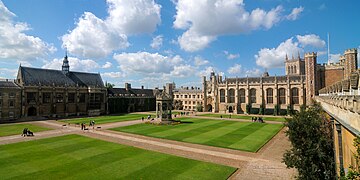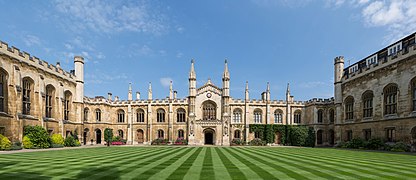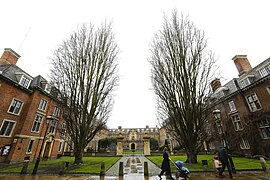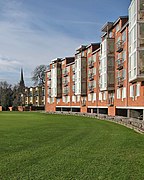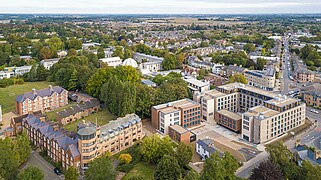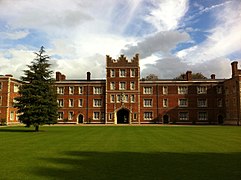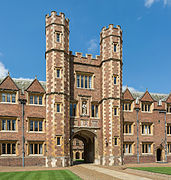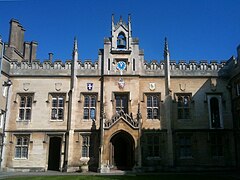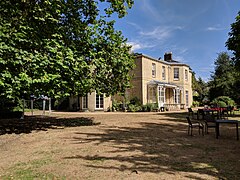University of Cambridge
The University of Cambridge is a public collegiate research university in Cambridge, England. Founded in 1209, the University of Cambridge is the world's third-oldest university in continuous operation. The university's founding followed the arrival of scholars who left the University of Oxford for Cambridge after a dispute with local townspeople.[10][11] The two ancient English universities, although sometimes described as rivals, share many common features and are often jointly referred to as Oxbridge.
Other name
The Chancellor, Masters and Scholars of the University of Cambridge
Latin: Hinc lucem et pocula sacra
Literal: From here, light and sacred draughts. Non literal: From this place, we gain enlightenment and precious knowledge.
c. 1209
£7.802 billion (2022; including colleges)[3]
£2.518 billion (2022/23; excluding colleges)[4]
6,170 (2020)[5]
3,615 (excluding colleges)[5]
24,450 (2020)[6]
12,850 (2020)
11,600 (2020)
- University town
- 617 hectares (1,520 acres)[7][a]
Cambridge Blue[9]
In 1231, 22 years after its founding, the university was recognised with a royal charter, granted by King Henry III. The University of Cambridge includes 31 semi-autonomous constituent colleges and over 150 academic departments, faculties, and other institutions organised into six schools. The largest department is Cambridge University Press & Assessment, which has £1 billion of annual revenue and reaches 100 million learners.[12] All of the colleges are self-governing institutions within the university, managing their own personnel and policies, and all students are required to have a college affiliation within the university. Undergraduate teaching at Cambridge is centred on weekly small-group supervisions in the colleges with lectures, seminars, laboratory work, and occasionally further supervision provided by the central university faculties and departments.[13][14]
The university operates eight cultural and scientific museums, including the Fitzwilliam Museum and Cambridge University Botanic Garden. Cambridge's 116 libraries hold a total of approximately 16 million books, around nine million of which are in Cambridge University Library, a legal deposit library and one of the world's largest academic libraries. Cambridge alumni, academics, and affiliates have won 121 Nobel Prizes.[15] Among the university's notable alumni are 194 Olympic medal-winning athletes[16] and several historically iconic and transformational individuals in their respective fields, including Francis Bacon, Lord Byron, Oliver Cromwell, Charles Darwin, John Harvard, Stephen Hawking, John Maynard Keynes, John Milton, Vladimir Nabokov, Jawaharlal Nehru, Isaac Newton, Sylvia Plath, Bertrand Russell, Alan Turing, Ludwig Wittgenstein, and others.
National rankings
1
3
3
4
2
5
Throughout its history, the University of Cambridge has frequently been featured in literature, artistic works, television, and film. As of February 2023, IMDb lists 82 films or television shows that feature the University of Cambridge as a filming location.[205]
Cambridge was mentioned as early as the 14th century in Geoffrey Chaucer's The Canterbury Tales. In The Reeve's Tale, the two main fictional characters are students at a University of Cambridge college called Soler Halle, which is believed to refer to King's Hall and is now part of Trinity College.[206]
The university has been the setting for all or parts of numerous novels, including Douglas Adams' Dirk Gently's Holistic Detective Agency, Rose Macaulay's They Were Defeated,[207] and Tom Sharpe's Porterhouse Blue.[208]
Other notable examples of the University of Cambridge in popular culture include:
